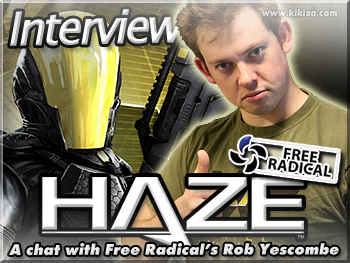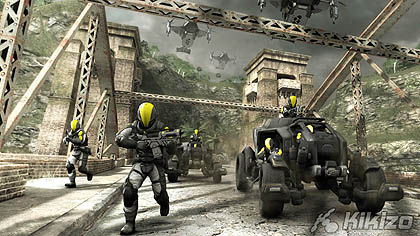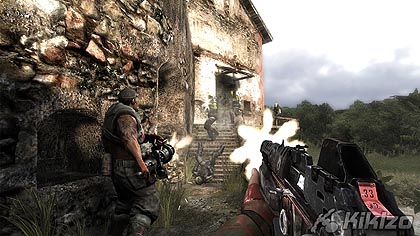Free Radical Haze Interview
FR's Rob Yescombe drops hints about TimeSplitters 4 and tells us what makes Haze different from the other shooters out there.
By Kikizo Staff
The market for console shooters is a buyer's paradise with dozens of games covering every popular sub-genre. That's fantastic news if you're a shooter fan, but what if you're a company trying to wade into this ever-deeper pool? For Free Radical, the creators of GoldenEye and more recently TimeSplitters, the strategy for Haze is to give gamers a hell of a lot of bang for their buck.

Last October we sat down with David Doak, co-founder of Free Radical, for a brief lesson in what makes Haze Haze. Doak told us all about the sometimes-good-sometimes-bad drug Nectar, a performance enhancer that not only makes you faster or stronger, it also has the nasty side-effect of blinkering your view of reality.
These conceits carry over from the singleplayer to the co-operative and multiplayer modes as well, as writer Rob Yescombe explained to us during a recent interview. Yescombe gave us a few hints about TimeSplitters 4 too, and told us why this is a game that is going to keep people playing for a long, long time.
![]()
Kikizo: How would you say Free Radical has changed since you joined the company?
Rob Yescombe: It's doubled in size. Well, more than that. We've taken on about 120 people extra since I started.
Kikizo: That's a big team.
Yescombe: It's getting bigger every day. We've got two major projects on the go. We're getting this out the door, but we've also got our top-secret Lucas Arts project and TimeSplitters 4.
Kikizo: Let's talk about the story a little bit. A lot of people are of the view that if it's a first-person shooter, people just want to shoot, but there's so much work that goes into the storyline, and this one seems quite interesting. It's obviously a war game, but war seems to take on a slightly different role in the storyline.
Yescombe: The simple fact is what you said earlier was more correct, which is that the gameplay is more important than the storyline. And even though I'm the writer, I fully acknowledge and accept that. If you're writing a movie, the foundation is the script. If you're making a game, the gameplay is the foundation and the script goes on top of that. The best part of Haze is the fact that it's great fun to shoot, run around and play the game. GoldenEye was pretty much the founding father of multiplayer games in terms of shooters, so we recognize the important of replayability, and that doesn't just have to come from the shooting part. As many facets as we can fit into the game, the more replay value it's going to have, the more value it's going to be for people who are playing their hard-earned cash for it.
Apart from having the singleplayer, the two sides, which makes it effectively two shooter experiences in one, then you've got four-player hot-swap co-op and the multiplayer missions and the multiplayer assault map narrative stuff as well, those are all reasons to play it all once, and then the story on top of that is another reason on top of that to play the game.
Kikizo: I agree with you that gameplay has to be tight. Can you comment more on the story and what your ambition was as the writer?
Yescombe: First and foremost the thing we didn't want to do was to be some preachy thing, because you don't play games to be lectured. However, I guess the best way to put it is that as I get older, I find it weirder and weirder that I pay my bills by helping produce a thing in which you shoot people in the face. And whilst I naturally dislike violence, I love virtual violence, and that dichotomy is a very strange place to find yourself, especially as you get older, especially as you get family and kids of your own. It becomes a very strange thing.
We're really the first generation of game designers who have kids and have families and are thinking about what this means, what does violence mean as a means of entertainment. I was saying to one of the other guys, Cliff Richard, when he first started singing rock-and-roll, it was, "My god, he's the devil, he's the spawn of the devil. Cliff Richard is going to turn our kids mad!" And that's the same spotlight that videogames have somehow found themselves under. Like rock-and-roll, it's the work of the devil. Haze raises those questions, but I don't know that there are answers to those issues. All I'm trying to do is acknowledge the fact that those issues exist in games and in the modern marketplace for entertainment.











 Satoru Iwata Video Interview - the late Nintendo president spoke with Kikizo in 2004 as 'Nintendo Revolution' loomed.
Satoru Iwata Video Interview - the late Nintendo president spoke with Kikizo in 2004 as 'Nintendo Revolution' loomed. Kaz Hirai Video Interview - the first of Kikizo's interviews with the man who went on to become global head of Sony.
Kaz Hirai Video Interview - the first of Kikizo's interviews with the man who went on to become global head of Sony. Ed Fries Video Interview - one of Xbox's founders discusses an epic journey from Excel to Xbox.
Ed Fries Video Interview - one of Xbox's founders discusses an epic journey from Excel to Xbox. Yu Suzuki, the Kikizo Interview - we spend time with one of gaming's most revered creators.
Yu Suzuki, the Kikizo Interview - we spend time with one of gaming's most revered creators. Tetris - The Making of an Icon: Alexey Pajitnov and Henk Rogers reveal the fascinating story behind Tetris
Tetris - The Making of an Icon: Alexey Pajitnov and Henk Rogers reveal the fascinating story behind Tetris Rare founders, Chris and Tim Stamper - their only interview? Genuinely 'rare' sit down with founders of the legendary studio.
Rare founders, Chris and Tim Stamper - their only interview? Genuinely 'rare' sit down with founders of the legendary studio. The History of First-Person Shooters - a retrospective, from Maze War to Modern Warfare
The History of First-Person Shooters - a retrospective, from Maze War to Modern Warfare